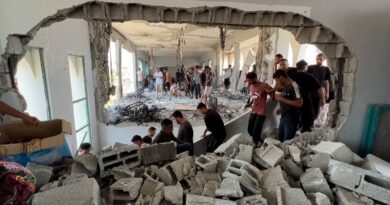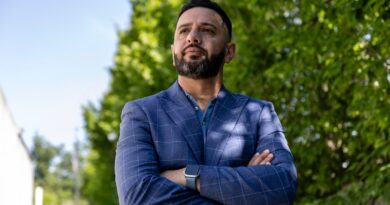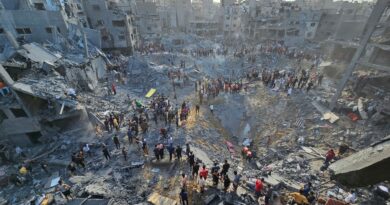Israel rejects genocide allegations at international court
In a landmark hearing Thursday, South Africa outlined its claim that Israel’s bombing and siege of Gaza showed its “intent” to commit genocide against Palestinians and urged the court to order a stop to the violence.
During three hours of remarks on Friday, the Israeli delegation dismissed the plausibility of genocide in Gaza and said that ordering Israel to stop military operations would leave Israeli civilians at risk. They accused South Africa of presenting a “grossly distorted” picture by largely ignoring the role of Hamas in the fighting and of politicizing the international convention against genocide.
South Africa “has now sought to invoke this term in the context of Israel’s conduct in a war it did not start and did not want,” Tal Becker, a legal adviser to the Israeli Ministry of Foreign Affairs, told the court, “a war in which Israel is defending itself against Hamas, Palestinian Islamic Jihad, and other terrorist organizations whose brutality knows no bounds.”
This week’s hearings will not assess whether Israel has committed genocide. Rather, judges will in the coming days consider South Africa’s call for provisional measures — interim steps aimed at stopping things from getting worse while the case plays out.
“At this stage, South Africa does not need to prove that Israel is committing genocide,” said Juliette McIntyre, a lecturer in law at the University of South Australia who specializes in international courts and tribunals. “They simply need to establish that there is a plausible risk of genocide occurring.”
A decision on provisional measures is expected within weeks.
At the heart of South Africa’s case is the assertion that Israel has shown “genocidal intent.” South African lawyers argued Thursday, for instance, that Israeli officials have deliberately used dehumanizing language to normalize “genocidal rhetoric” and incite soldiers on the ground.
Israeli lawyers on Friday said South Africa had cherry-picked quotes and taken remarks out of context.
The Israeli delegation also cited phone calls and leafleting to warn Palestinians of incoming airstrikes, evacuation orders and aid trucks entering Gaza as evidence that it does not have genocidal intent.
On Thursday, Blinne Ni Ghralaigh, an Irish lawyer on the South African team, argued that there is an urgent need for the court to order provisional measures citing the risk of “irreparable” harm to Palestinians in Gaza. “On average, 247 Palestinians are being killed and are at risk of being killed, each day, many of them literally blown to pieces. They include 48 mothers each day, two every hour. And over 117 children, each day,” she said.
Omri Sender, representing the Israeli side, countered Friday that the condition of urgency is not, in fact, as urgent as South Africa suggested, saying that the “the scope and intensity of the hostilities has been decreasing.”
Christopher Staker, also representing Israel, said South Africa’s call for a provisional order is unwarranted, prejudicial and would hand an advantage to Hamas and harm Israeli civilians.
The International Court of Justice was established after World War II as a means to settle disputes between nations. In 1948, genocide was made a crime under international law, and the court was empowered to determine whether states have committed it.
The court’s rulings are legally binding but are hard to enforce. For instance, Russia ignored the ICJ’s order to immediately halt its invasion of Ukraine. Legal analysts said it could be years before the court rules on the case.
For many Palestinians, the global airing of South Africa’s case accusing Israel of genocide in its military campaign against Hamas in Gaza was not just welcome as a chance to stem the violence that has killed tens of thousands. It was also a rare public reckoning of Israel’s occupation of Palestinian territory and policies they view as apartheid.
“We feel seen for the first time,” said Diana Buttu, a Palestinian human rights lawyer and onetime adviser to Palestinian Authority President Mahmoud Abbas. “It was no longer just Palestinians versus Israel; it was another state putting its diplomatic relations on the line to make the case.”
Supporters gathered in Nelson Mandela Square in Ramallah, the West Bank, on Thursday, waving Palestinian and South African flags after a South African legal team presented its arguments to the tribunal in The Hague. Social media came alive with celebratory postings.
The proceedings were big news in Israel, where detailed arguments against the military’s actions don’t always get a wide airing. Commentators mostly dismissed the legal case, saying it largely ignored the brutal Oct. 7 attacks in Israel that killed about 1,200 people and swept almost 250 hostages into Gaza, where more than 100 hostages are still thought to be remaining.
Buttu, who helped present a case against the separation barriers that Israel built to isolate West Bank communities, said a failure to issue an order curtailing military actions in Gaza would amount to a failure of the international legal system. But even just having the arguments laid out so methodically amounts to a milestone for Palestinians, she said.
“It’s already done something important,” she said. “This isn’t just about the genocide convention; it’s much broader than that.”




